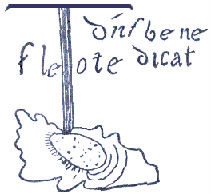Peace and Good!
Brother Masseo once asked Brother Francis: “Why after you? Why is it that so many people follow after you? You’re not attractive looking or well born or a gifted orator.” And Francis answered that it was because in him they saw the greatness of God’s mercy. “For if the Lord had shown so much mercy to the greatest sinner, he would be more grateful than me.”
The parable of the Pharisee and the Publican, from the Gospel of Luke, is this Sunday’s Gospel. A powerful meditation. We usually focus on the two persons involved, but as always, Jesus calls us first of all to focus on God, and what God does for us. For the Pharisee is not a hypocrite in what he does; his problem is that he uses it to lift himself up, and by doing so separates himself “from the rest of men.” Pharisee means 'one who separates himself,' and the reason the Pharisees did so was so that they could keep the law in its fullness. This was not bad in itself. The problem was that it tempted them to think of themselves as some how fundamentally different from ‘the others,’ especially from “pagans and sinners.” What Jesus tried to show them again and again was that they were prone to the same temptations and could sin just as much as the publicans and prostitutes. Their zeal for observance could become pride and self-righteousness. Jesus reminded the Pharisees, and us, of the need to recognize that all goodness comes from God, and that God is the Creator of all.
To separate ourselves, at least in our minds and our hearts, from “the rest of people,” is to face the same temptation as the Pharisees. We all seek ways to exalt ourselves, to ‘feel good about ourselves’ by looking down on others. Our prayer can be like that of the Pharisee, “Thank God I am not like the rest.”
Of course, it can take so many forms
“Thank You Lord that I am a conservative, not like those loony liberals.” or “that I am a liberal, not like those creepy conservatives.” It can be: “Thank You that I am an environmentalist, not like those selfish consumers.” or “that I am a responsible business person, not like those nutty tree huggers.” Or “that I am from the city, not like those hicks from the country.” Or “that I am a good country person, not like those shallow city people.” And it could go on and on. All these thoughts are ways we exalt ourselves.
Francis was tempted to do the same thing; he could have looked down on the merchants and soldiers and revelers who were his peers. He could have looked down on those who did not follow his path, who did not dedicate their lives to the Gospel. But he learned from Jesus not to look down on anyone, because he knew himself to be as much a sinner as any of them. I don’t think this was just some sort of ‘holy humility’ that saints have: it was real. He knew that what made the difference in his own life was not what he did, but what God did for him. And he knew that if he were to believe really in the love of God for him, he had to believe in the love of God for all men and women, the greatest saints and the most miserable sinners. He was not different “from the rest.” Neither are any of us.
And that God for that! Because we have to remember that Jesus came to save sinners, to call sinners, to seek the lost. So we can only be saved if we place ourselves among them, like the publican did in the parable. “O Lord, have mercy on me, a sinner.”
God bless and keep you!
Subscribe to:
Post Comments (Atom)

No comments:
Post a Comment